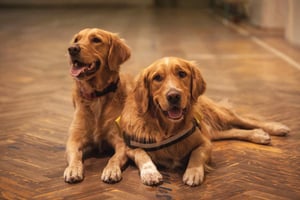Having a puppy can be a joy, but it can also be a challenge. One of the biggest challenges is...
When to Start Training Your Puppy: A Comprehensive Guide
Training a puppy can be a daunting task. It requires patience, dedication and consistency. This article will provide an in-depth look at when to start training a puppy and how to go about it. We will discuss the importance of socialisation, the best age to start training and how to use positive reinforcement to teach your pup.
Socialisation and Puppy Training
Socialisation is an important part of a puppy's development. It is essential for puppies to have positive experiences with people and other animals during the early stages of their lives. Socialisation helps them learn how to interact with the world around them. This can help prevent fear and aggression in the future. The ideal time to start socialising a puppy is between 8 and 16 weeks of age. This is when their socialisation window is at its peak. During this time, it is important to expose them to different people, animals, sounds, and environments.
It is also important to start training your puppy during this time. Puppies are like sponges and can learn quickly, so it is important to start teaching them basic commands as soon as possible. Positive reinforcement is the best way to train a puppy and ensure they learn quickly and effectively. This involves rewarding them with treats and praise when they do something correctly. This will help reinforce the behaviour and make it more likely that they will repeat it in the future.
Best Age to Start Training a Puppy
The best age to start training a puppy is 8 weeks old. At this age, puppies are just starting to become aware of their environment and can start to learn basic commands. It is important to start training as soon as possible, as puppies can learn quickly and will become more difficult to train as they get older. Starting at 8 weeks old also ensures that the puppy is socialised and has had positive experiences with people and other animals.
It is important to remember that puppies are still learning and may make mistakes. It is important to be patient and understanding when training a puppy. If they make a mistake, it is important to correct them gently and provide positive reinforcement when they do something correctly. It is also important to be consistent with training and ensure that everyone in the family is using the same commands and techniques.
Incorporating Training into Your Puppy's Life
Training your puppy should be an enjoyable experience for both you and your pup. It is important to make sure that training sessions are short and fun. Training sessions should only last for 10-15 minutes at a time and should be done several times a day. This will help ensure that your puppy stays focused and is able to learn quickly. It is also important to incorporate training into your puppy's everyday life. This can help reinforce the commands and make it easier for them to learn.
For example, if you are teaching your puppy to sit, you can ask them to sit before you give them their food or a treat. This will help them learn the command quickly and make it easier for them to remember. You can also incorporate commands into your everyday activities, such as going for a walk or playing fetch. This will help reinforce the commands and make it easier for your pup to learn.
Conclusion
Training a puppy can be a daunting task, but it is important to start as soon as possible. The best age to start training a puppy is 8 weeks old. It is important to incorporate socialisation and positive reinforcement into your puppy's training routine. It is also important to make sure that training sessions are short and fun. Incorporating training into your pup's everyday life can help reinforce the commands and make it easier for them to learn. With patience, dedication and consistency, you can ensure that your puppy receives the best training possible.


